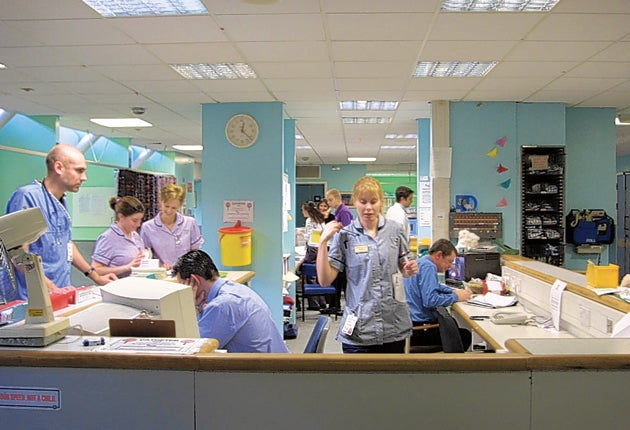Your support helps us to tell the story
From reproductive rights to climate change to Big Tech, The Independent is on the ground when the story is developing. Whether it's investigating the financials of Elon Musk's pro-Trump PAC or producing our latest documentary, 'The A Word', which shines a light on the American women fighting for reproductive rights, we know how important it is to parse out the facts from the messaging.
At such a critical moment in US history, we need reporters on the ground. Your donation allows us to keep sending journalists to speak to both sides of the story.
The Independent is trusted by Americans across the entire political spectrum. And unlike many other quality news outlets, we choose not to lock Americans out of our reporting and analysis with paywalls. We believe quality journalism should be available to everyone, paid for by those who can afford it.
Your support makes all the difference.The NHS in England faces a total bill of £65bn for new hospitals built under the private finance initiative (PFI), it was reported today.
Figures obtained by the BBC show that some NHS trusts were left with annual "mortgage" repayments accounting for more than 10% of their turnover.
Under PFI, private companies win contracts to build and maintain new hospitals and mental health units and the NHS pays off the "mortgage" over around 30 years.
The 103 schemes were valued at a total of £11.3bn when they were built.
But when rising fees and additional costs such as maintenance, cleaning and catering are taken into account, the NHS will have to pay back £65.1bn over the lifetime of the schemes.
According to the data, the NHS currently pays back a total of £1.25bn each year but this figure is expected to increase until 2030 when it will hit £2.3bn, the BBC reported.
The final payment will not be made until 2048.
Professor John Appleby, chief economist at the King's Fund health think-tank, said: "It is a bit like taking out a pretty big mortgage in the expectation your income is going to rise, but the NHS is facing a period where that is not going to happen."
Dr Mark Porter, of the British Medical Association, added: "Locking the NHS into long-term contracts with the private sector has made entire local health economies more vulnerable to changing conditions.
"Now the financial crisis has changed conditions beyond recognition, so trusts tied into PFI deals have even less freedom to make business decisions that protect services, making cuts and closures more likely."
Nigel Edwards, director of policy at the NHS Confederation, which represents trusts, told the BBC: "They were planned for a different world. I'm sure that in some cases people feel their hands are tied."
A Department for Health spokeswoman said: "PFI is about providing new and improved facilities for the long term benefit of patients.
"The Department scrutinises all PFI schemes to make sure they are value for money when compared to an equivalent publicly funded scheme.
"In many cases, repayments include not only the initial capital cost and financing charges, but also all ancillary services like cleaning, portering and building maintenance costs over the life of the contract."
Peter Blackmore, construction partner at law firm McGrigors, said: "Hospitals are not cheap to build but PFI deals ensure that the private sector usually bears the entire upfront cost and the cost of overruns, ongoing maintenance and management.
"You cannot simply look at the total cost of the repayments and say that's too much.
"While large repayments in today's market may seem onerous, it's even less likely that NHS trusts could afford to pay upfront for such major projects.
"The PFI industry is putting a lot of effort into developing funding models that will ease pressure on its public sector partners yet allow important public infrastructure projects to continue without delay.
"It would be wrong to write off private finance as irrelevant in today's market."

Join our commenting forum
Join thought-provoking conversations, follow other Independent readers and see their replies
Comments